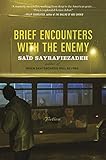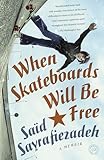1.
 I recently found myself compelled to revisit Tim O’Brien’s The Things They Carried for lots of reasons, not the least of which was reading Saïd Sayrafiezadeh’s remarkable new collection of war stories, Brief Encounters with the Enemy. I wanted some context for the experience. In fact, after reading Brief Encounters…, I asked several friends and colleagues if they were asked to suggest a work of war literature, what would it be? The responses were what you’d expect: The Naked and the Dead, Catch-22, some recent examples, like The Yellow Birds, or Tree of Smoke, but overwhelmingly the book suggested was O’Brien’s. It was the first book I’d thought of, too, and so I dug around for my copy.
I recently found myself compelled to revisit Tim O’Brien’s The Things They Carried for lots of reasons, not the least of which was reading Saïd Sayrafiezadeh’s remarkable new collection of war stories, Brief Encounters with the Enemy. I wanted some context for the experience. In fact, after reading Brief Encounters…, I asked several friends and colleagues if they were asked to suggest a work of war literature, what would it be? The responses were what you’d expect: The Naked and the Dead, Catch-22, some recent examples, like The Yellow Birds, or Tree of Smoke, but overwhelmingly the book suggested was O’Brien’s. It was the first book I’d thought of, too, and so I dug around for my copy.
The first thing that struck me was the epigraph, taken from John Ransom’s Andersonville Diary:
This book is essentially different from any other that has been published concerning the “late war” or any of its incidents. Those who have had any such experience as the author will see its truthfulness at once, and to all other readers it is commended as a statement of actual things by one who experienced them to the fullest.
What struck me was how this epigraph could just as well work for Sayrafiezadeh’s book, for very different but no less relevant reasons.
2.
 For O’Brien the epigraph serves as something of a warning: beware, this is truth, but you might not recognize it. His version of war will be significantly different.
For O’Brien the epigraph serves as something of a warning: beware, this is truth, but you might not recognize it. His version of war will be significantly different.
And it is.
The Things They Carried wants to convey viscerally and poetically what it was really like, over there. Which for O’Brien means disorientation, confusion, fractured sensory experienced, amorality, and a memory that cannot be trusted. Truth is entirely up for grabs. Probably my favorite story in the bunch is the often quoted and practically protean “How to Tell a True War Story,” which opens with a short, sly, and pretty bold statement: “This is true.” O’Brien then proceeds to dismantle a few presumptions regarding truth: “A true war story is never moral;” “If a war story seems moral, do not believe it;” “In many cases a true war story cannot be believed. If you believe it be skeptical;” “Often in a true war story there is not even a point;” there’s plenty more. Prior to O’Brien, the mission of the war story was mostly to tell civilian readers what it was like over there, “there” being a main point. In fact, think of the mythic narrative that surrounds the “thereness” of war: from the seminal American anthem, “Over There” (here’s a colorized clip of Jimmy Cagney singing it from Yankee Doodle Dandy), to Dalton Trumbo’s award-winning novel Johnny Got His Gun, inspired by the anthem’s opening line (“Johnny get your gun, get your gun, get your gun”), to Metallica’s video for “One,” a song inspired by Trumbo’s novel, the video cut with clips from the novel’s infamous film adaptation. But O’Brien’s story decries these three versions of truth. In fact, the story closes with: “in the end, of course, a true war story is never about war.” Which brings us back to Sayrafiezadeh’s book, a dynamite collection of war stories, with hardly any war in them at all.
3.
 Sayrafiezadeh is no stranger to writing books that artfully navigate contemporary politics. His 2009 memoir <i>When Skateboards will be Free is basically the story of a kid growing up in Pittsburgh, and his strained adult relationship with his father. But it also happens to be the engrossing story of a youth spent in the Socialist Worker Party, and the best firsthand account of American fundamentalist ideological indoctrination I’ve ever read (I’ve read quite a few, I have my reasons…). What makes Brief Encounters with the Enemy such a singular book is not so much Sayrafiezadeh’s attempt at conveying what war feels like right now, but his choice of location. This is not a book about there. It’s about here, what America feels like, here, and now, while at war.
Sayrafiezadeh is no stranger to writing books that artfully navigate contemporary politics. His 2009 memoir <i>When Skateboards will be Free is basically the story of a kid growing up in Pittsburgh, and his strained adult relationship with his father. But it also happens to be the engrossing story of a youth spent in the Socialist Worker Party, and the best firsthand account of American fundamentalist ideological indoctrination I’ve ever read (I’ve read quite a few, I have my reasons…). What makes Brief Encounters with the Enemy such a singular book is not so much Sayrafiezadeh’s attempt at conveying what war feels like right now, but his choice of location. This is not a book about there. It’s about here, what America feels like, here, and now, while at war.
The stories are linked by way of subject and space, set in what feels eerily like your average and somewhat depressed American city (Wal-Marts and convenience stores, suburbs, city blocks, and bus routes), sometimes hilariously referred to as an “Emerging International City,” but one that refuses to name itself. That refusal lends the collection a strange sort of intimacy from its opening pages, a dreamlike déjà vu. And Sayrafiezadeh’s subject: how does a nation go about its daily business while its young men and women kill and die at war for more than a decade already? There are parades, yes, of course, like in “Paranoia,” when the narrator and his friend Roberto drive to downtown to see the 4th of July Parade: “The turnout was extraordinary,” and “[p]eople applauded, but the applause seemed to disorient the veterans.” But parades can’t happen everyday, and so for the remainder of each year, we lose our jobs, and get new jobs, house-watch for friends, and fall in love on the coffee line. All of which happens in Brief Encounters… Which is to say, we are at war and we simply go about our business. But such a state of schizophrenic complacency does have its price.
The entire collection is marked by a mix of malaise and foreboding that feels uncannily like American life right now. Uncertainty about weather and “the war” pervade these stories: “It was winter now and it was cold and the bus drivers were on strike. And the war was coming, everybody said so,” says the narrator of “Cartography;” “When April arrived, it started to get warm and everyone said that the war was definitely going to happen soon and there was nothing anybody could do to stop it,” from “Paranoia.” The sense throughout is of an anxious culture, a culture in which war looms, almost naturally, cyclically. And one that shares a kind of secondhand collective (mis)understanding, “everybody said so.” A culture in which military imagery and heroic language is appropriated by daily routine and has no meaningful corresponding relationship to its real world referent: a bus rider on a cramped bus describes sweating heavily, “rivulets ran from my armpits down my sides and collected in the elastic of my underwear. This is what it must feel like for soldiers on the transport heading to battle;” line cooks “come to the aid of another who has fallen far behind, as if in battle,” and they scald themselves with boiling water like “grenades had gone off” in their hands, and still they “continue marching onward up the hill.” In “Operators,” Wally comes back from the war “to great fanfare, that I felt undeserved,” says the narrator. “He had departed to great fanfare too — which was also undeserved.” What follows is a totally uncomfortable, and poignant, and just plain funny tug-of-war between two co-workers for the attention of the pretty office girls. Now seems like a good time to say how funny all of these stories are, and I don’t mean punch line funny, I mean tragicomedy along the lines of Bellow and DeLillo.
There is one honest to goodness story here about a young soldier at war, the title story, in which the soldier finds himself mostly getting bored: “Instead of getting in shape, I started to get fatter.” He does have a cool gun, however, so cool and creepily like a sort of militarized iPhone, that it not only shoots bullets, but tells the time and temperature too.
Plus it could kill a man from a mile away. You hardly even had to pull the trigger. If you put your finger in the proximity of the trigger, it sensed what you wanted to do and it pulled itself. Poof went the bullet, and the gun would vibrate gently, as if you were getting a call on your cell phone.
Among all the things this soldier carries — “it was the lightest thing on me.”
Brief Encounters with the Enemy does something rare in that it contributes something new and “essentially different” to the literature of war — our stories, about what it’s like over here. It’s discomfiting, and surprising, and illuminating to say the least. I’ve not read anything like it before.








